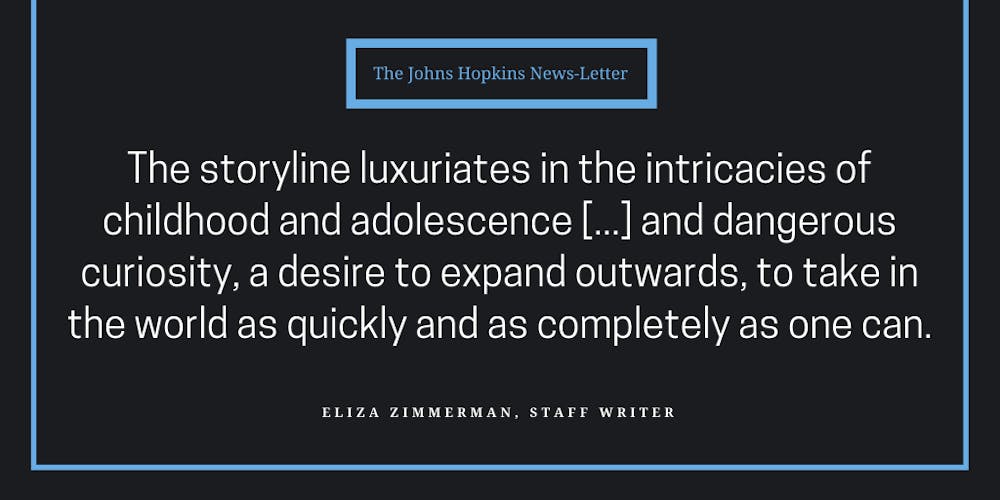Over the last 11 months, I’ve found it increasingly hard to sit through a movie in one sitting or even to coax myself into viewing a film at all, really. Since I’m on my computer all the time, seated in one place for classes and work, sitting down to watch something online for a couple of hours has become incredibly unappealing. This upset me for a while because, like many, I have an unending wish list of movies to go through. I’ve made approximately zero headway in the last year.
Enter: You Will Die at 20, a 2019 Sudanese drama film directed by Amjad Abu Alala, which won the “Lion of the Future” award for a debut film at the Venice Film Festival and was released in the U.S. late last month. I don’t remember how I came across the film, but I remember typing the name into Google one day and being struck by the vibrant, tableau-like stills that populated the results. In an attempt to get myself out of my movie funk, I decided to give a portion of my Saturday night to watching it (if after this review you feel like doing the same, it’s accessible behind a $10 paywall on Michigan Theater’s “Eventive” page).
You Will Die at 20 is one of the most beautiful and engaging films I’ve ever seen. It unfolds against the background of a Sudanese village and follows the life of a young boy, Muzamil (Mustafa Shehata), who had been prophesied to die at 20 by a holy sheikh when he was a newborn.
This prophecy sets off a catalyst of events: Muzamil’s father travels away from the family soon after, ashamed and pained by his son’s fate. His mother Sakina (Islam Mubarak) must raise Muzamil on her own while grappling with the implications and injuries of her only child being a public subject of such a sealed fate. In an instant, the joys of new motherhood are stripped away; she dons all black and her face grows paler, drawn in.
Indeed, throughout the film, it is Mubarak’s character who stands out, who takes and is given an equal emotional depth and battle as her son. From intense passion to deep sadness to regulated, mothering responses and guidance, she counts her son’s days haphazardly on a wall with charcoal. We see both Muzamil and Sakina grapple with his evolution as he grows up in the shadows of his fate.
The storyline luxuriates in the intricacies of childhood and adolescence, the cruelty of young boys, the strength and limitations of religious devotion and the sweeping heartbreak of young love. Throughout there is a theme of dangerous curiosity, a desire to expand outwards, to take in the world as quickly and as completely as one can. Muzamil finds a guide in a local, worldly drunk, to whom he delivers alcohol. He grows enraptured with his childhood best friend, Naiema (Bonna Khalid), and frustrated with his mother’s rules. He dives into religious devotion and reaches the bottom of its capabilities in his life. He cares for and is looked after by others in his village, even as they harm and ostracize him.
This all unfolds against the backdrop of desert architecture and of vibrant colors and mesmerizing, mural-like shots that contain and draw attention to the beauty and pain of this small village, aspects that often collide with each other. The movie is worth viewing for the story alone but also for the way that so many of the characters are afforded emotional complexity and sympathy. Even Muzamil’s absent father is humanized. Muzamil’s struggle for autonomy and love is both respected and challenged in a fascinating way. That being said, it is also a visually stunning piece of art.
Included in this film are stunning imagery and unrelentingly sharp, tangible and symbolic shots that grant us access to the truly intricate emotional world of You Will Die at 20. I’m hesitant to write anything else, although there’s no great riling up of suspense. The film is largely a tapestry of intersecting, smaller conflicts that build on the initial setup. The stories are so unique and fascinating, and the characters and their relationships are so compelling that I don’t want to reveal anything more about the story. I only implore you to watch it, even with the price tag, because it is worth it in every sense of the word. It got me back into watching movies, and I certainly have been pushing everyone in my life to watch it as well.
Also, please remember this one thing while going through the film: Pay attention to the horses.





